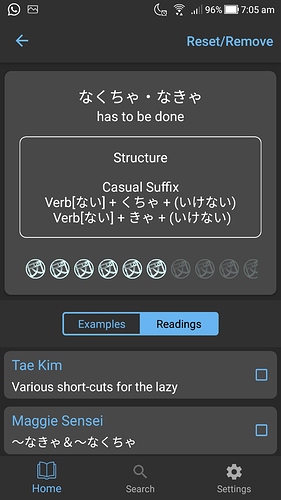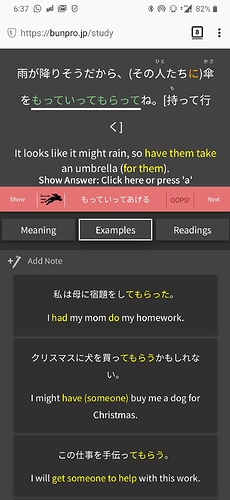It would be nice if sentences like:
“Let’s be nice(as a favor) to our friends”
Would not get shortened to something like:
“Let’s be nice ~ as a favor”
But to something like:
“Let’s be nice (as a favor)”
I just clicked backspace to undo a wrong answer (use ops) and the review completely changed. It seems to have undone my mistake because I could click wrap up instantly, but not exactly what should have happened. :3
When using the community link from the dropdown menu on the normal bp site (aka not the forums), it asks me to log in, but if I use the community link that is in the bar (aka beside my username) I don’t have to log in because that one recognizes I am already logged in. It probably has to do with that they point to different pages.
The community link in the bar goes to (where I am logged in): https://community.bunpro.jp/
The community link in the drop down goes to (where I am apparently not logged in): https://community.bunpro.jp/session/sso
This one also gets shortened wierdly:
To:
“I was given ~ gave me”
Also shouldn’t the answer be something like “くれた” instead of “くれて” since it is in the past?
No, because the only way to have a past-tense (た-form) verb mid-sentence is if it’s directly followed by a noun to form what’s known as a relative clause, e.g. 忘れられた物, meaning “forgotten thing.” (You’ll want to make sure you get super comfortable with recognizing/understanding relative clauses btw, because AFAIK it’s the only way to describe a noun mid-sentence with anything more than a simple adjective.)
Anyway, since this isn’t a relative clause, くれる needs to be in て-form to behave conjuctively. In this structure, [verb 1]+て → [verb 2], the verbs are understood to be sequential. Since v1 happened before v2, the English translation shows v1 in past tense, even though v1 was never explicitly assigned a specific tense in Japanese.
Also, I’m not sure what you mean by “shortened weirdly.” I don’t see a need to reword that translation. What’s weird about it?
Thanks for the answer. Is there some kind of grammar point for this behavior in bunpro?
With shortened wierdly I mean that when you set the review English setting to hint it only displays the text “I was given ~ gave me” Wich is misleading since you can’t see that the gave me part is just part of a rephrasing of the sentence.
Here is another example:
It doesn’t look like there’s a grammar point dedicated to it as of now, but one of the linked readings for Verb[て] is Tae Kim’s page on Expressing a sequence of states.
I also agree with this one. When I get those, like the review I got today:
I had to show the full translation to have a chance at understanding what was actually asked. Every time I get confused, because sometimes the X~XYZ are both part of the translation, and sometimes the second part XYZ in this case, goes inside brackets when the full translation shows.
Consistency is needed. So if the english hint for this review should probably show like this:
many [as many as]
Or something similar, such as:
many~[as many as]
Not sure if this is a bug or if I’m just an idiot, but what is this colloquial form of ば?
I have done all of N5 and all of lesson 1 of N4, but haven’t seen this yet. I know this is part of conditionals from a little osmosis, but I haven’t had the lessons for that yet. Am I overseeing something here or is this an error?
The red part is of course the colloquial part of it, but what has that to do with ば?
なければ gets shortened to なきゃ.
なくては gets shortened to なくちゃ.
It’s a specific lesson in Bunpro, which this is a review for. So I guess you forgot. 
The grammar structure for にしたがって should list the alternate form as にしたがい, not したがい.
@Pushindawood I added a custom sentence to a grammar point (first time I’ve done this) before doing the lesson for it. When I finally went to do the first review for this item, I got two reviews: one for my custom sentence, and one for a standard sentence. That’s not expected, right?
@backto2122 and @MissDagger I have updated the grammar points that you have pointed out to include additional hints in parentheses or in brackets. Please let me know if you come across any others that need to be updated. Cheers!
@seanblue I have updated the grammar structure for にしたがって. Thank you for pointing that out. Self Study sentences will appear right alongside regular Bunpro reviews. Therefore, if you add an item to your reviews and immediately create a custom sentence, both Bunpro’s sentence and the sentence you created will appear in the same review session. Custom sentences behave just like Bunpro sentences in that they are immediately made available for review when you create one and will be subject to the same SRS intervals (although they do not affect the SRS/streak of that particular grammar point). Think of Self Study questions as custom Anki flashcards that you just add to your already existing deck. We are considering creating an option where you can study custom sentences separately from your regular reviews. Cheers.
Wait, so they will show up as extra reviews? Is the idea to more or less mimic sentence mining Anki decks?
That is correct. Our intention was to give you the option to create your own manual-input review sentences that you could add to your review queue to study alongside your normal Bunpro reviews. Whether you are mining sentences or not, we wanted you to have the freedom to use Bunpro’s review system to study additional content. Cheers.
Ah of course! I vaguely remember now.
Though the lesson was only about the shorthand for that grammar. I read the texts, but didn’t seem to have memorised it. It is still a bit of a vague descriptor is you have only learned なきゃ and なくちゃ, but I guess it is the best descriptor available.
Mentioned before: toggling furigana for example sentences in study mode will force the page to scroll all the way up. Very annoying on mobile.
And in reviews it’s still not focusing the input correctly after toggling furigana.











